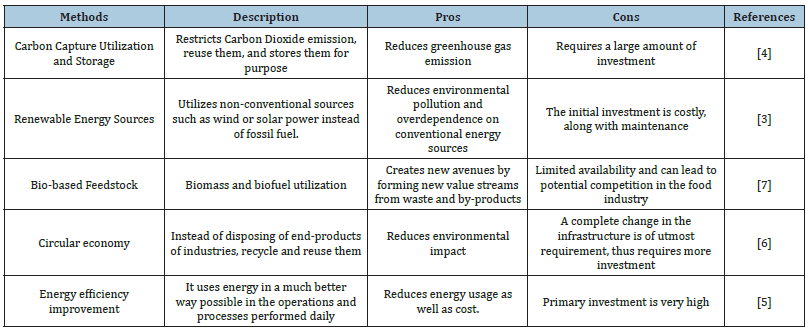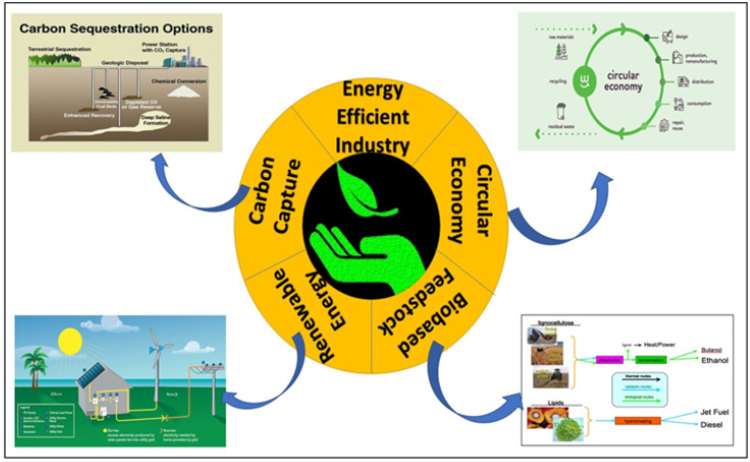- Submissions

Full Text
Progress in Petrochemical Science
Greening the Petrochemical Industry: Strategies for Sustainability
Anuvab Dey1, Subhrojyoti Ghosh2 and Debashis Kar3*
1Department of Biological Sciences and Bioengineering, IIT Guwahati, North Guwahati, Assam, India
2Department of Biotechnology, IIT Madras, Chennai, Tamil Nadu, India
3Department of Biotechnology, Ramaiah University of Applied Sciences, Bangalore, India
*Corresponding author: Debashis Kar, Department of Biotechnology, Ramaiah University of Applied Sciences, Bangalore, 560054, India
Submission: March 23, 2023;Published: April 06, 2023

ISSN 2637-8035Volume5 Issue2
Abstract
The petrochemical industry consumes fossil fuels, generates ample amounts of greenhouse gases, and the necessary items we need regularly. With the increasing emphasis on sustainability and environmental responsibilities to deal with environmental pollutants, industry needs adaptation to greener practices. This mini review aims to shed light on the strategies that have been implemented already, such as the use of renewable energy sources, the implementation of the circular economy principle, the adaptation of a cleaner production process, and the development of a more sustainable feedstock to green the petrochemical industry with a focus on sustainability. The review also discusses the challenges and limitations associated with the complete implementation of the ideas due to the economic issues coming in between. Overall, it will highlight the need for innovative strategies to achieve a sustainable goal and the role of stakeholders, including government, companies, and consumers, to work hand-in-hand to make the future beautiful.
Keywords: Fuels; Greenhouse; Environment; Energy sources; Economic
Introduction
The petrochemical industry is one of the leading contributors to the world economy, supplying valuable materials for a wide range of products and industries. On the other hand, it is also one of the most significant contributors to greenhouse gas emissions [1]. Along with the expansion of civilization and anthropogenic activity daily, we have started to face significant challenges in maintaining a proper healthy environment. Thus, efforts must be made and appropriately implemented to promote sustainability and combat climate change. Further adaptation of greener practices and strategies will reduce the industry’s environmental impact and pave the way toward a sustainable future [2].
Strategies Involved to Ensure a Greener Industry
The petrochemical industry is working to adopt greener practices and promote sustainability through various strategies. One strategy is using renewable energy sources, such as solar and wind power, for production processes. This helps reduce greenhouse gas emissions and energy costs [3]. Additionally, companies are implementing energy-efficient technologies and optimizing their operations to reduce energy consumption and increase efficiency [4,5]. Another strategy is adopting circular economy principles, which involve reusing and recycling materials to minimize waste and reduce environmental impact. For example, companies are implementing closed-loop systems, where waste products are repurposed as feedstock for new products rather than being disposed of [6]. This helps reduce waste and conserve resources, leading to more sustainable production practices.
In addition to these strategies, companies are also developing more sustainable feedstocks, such as biobased and renewable feedstocks, to reduce their reliance on fossil fuels [7]. This helps reduce greenhouse gas emissions and can help promote a more circular economy by creating new value streams from waste and by-products. Additionally, companies are exploring alternative feedstocks, such as carbon capture and utilization technologies, to reduce their carbon footprint [8]. Finally, companies are also investing in cleaner production processes, such as catalytic processes and biorefineries, to reduce the environmental impact of their operations [4]. This involves developing and implementing new technologies and techniques to reduce emissions and minimize waste. (Table 1) summarizes the methods that are implemented and their pros and cons (Figure 1).
Table 1:Summarizes the methods that are implemented and their pros and cons.

Figure 1The above diagram summarizes the different methods that can be useful in making the petrochemical industry sustainable.

Challenges and Limitations
The greening of the petrochemical industry is a complex and challenging task, and several limitations are associated with the strategies being implemented to promote sustainability. One of the primary limitations is the high cost of implementing these strategies. For example, the transition to renewable energy sources can be expensive and require significant investments in infrastructure and technology [3]. Similarly, adopting cleaner production processes may involve installing new equipment, which can be costly [4,5]. Another limitation is the complexity of implementing circular economy principles in the petrochemical industry. The traditional linear model of production and consumption has been deeply ingrained in the industry, and transitioning to a circular model requires a significant shift in mindset and practices [6]. Additionally, the circular economy approach may not be suitable for all petrochemical products, and there may be limitations in terms of feedstock availability and quality [8]. Finally, the development of sustainable feedstocks can also be challenging due to limitations in feedstock availability and quality [7]. There may also be competition for these feedstocks from other industries, such as the biofuel industry, which can drive up prices and limit their availability. While the petrochemical industry is progressing toward sustainability, gaps in the process must be addressed. One of the most significant gaps is the lack of standardized sustainability metrics and reporting frameworks [6]. Without clear and consistent metrics, it is not easy to accurately assess the environmental impact of petrochemical production and track progress toward sustainability goals.
Conclusion
The greening of the petrochemical industry is crucial for maintaining a proper healthy environment. With this sustainability’s limitations, including high cost, complexity, and feedstock availability, there is always a way out; we must address them to ensure that the industry can successfully transition to achieve a more sustainable model.
References
- Gonzalez FR, Guillen PF, Biglieri VJE (2023) Environmental strategy and the petroleum industry: A sustainability balanced scorecard approach. Journal of Petroleum Exploration and Production Technology 13(2): 763-774.
- Keawboonchu J, Thepanondh S, Kultan V, Pinthong N, Malakan W, et al. (2023) Integrated sustainable management of petrochemical industrial air pollution. International Journal of Environmental Research and Public Health 20(3): 2280.
- Kamal MR (2021) Renewable energy for sustainable petrochemical production. Journal of Cleaner Production p. 312.
- Bohre S (2020) Cleaner production techniques for the petrochemical industry. In Clean Energy for Sustainable Development Springer, Germany, pp. 179-195.
- Govil T, Wang J, Samanta D, David A, Tripathi A, et al. (2020) Lignocellulosic feedstock: A review of a sustainable platform for cleaner production of nature’s plastics. Journal of cleaner production 270.
- Huang C, Shen W, Xu M (2021) Circular economy for the petrochemical industry in China: Policy, practice, and potential. Journal of Cleaner Production 294: 126181.
- Laurichesse S, Gallezot P, Pinel C (2021) Sustainable feedstocks for the petrochemical industry: An overview. Journal of Cleaner Production 285: 125164.
- Kong X, Jiang S, Wei M, Ma H (2020) The application of circular economy in the petrochemical industry. Journal of Cleaner Production, Elsevier, 259.
© 2023 Debashis Kar. This is an open access article distributed under the terms of the Creative Commons Attribution License , which permits unrestricted use, distribution, and build upon your work non-commercially.
 a Creative Commons Attribution 4.0 International License. Based on a work at www.crimsonpublishers.com.
Best viewed in
a Creative Commons Attribution 4.0 International License. Based on a work at www.crimsonpublishers.com.
Best viewed in 







.jpg)






























 Editorial Board Registrations
Editorial Board Registrations Submit your Article
Submit your Article Refer a Friend
Refer a Friend Advertise With Us
Advertise With Us
.jpg)






.jpg)














.bmp)
.jpg)
.png)
.jpg)










.jpg)






.png)

.png)



.png)






